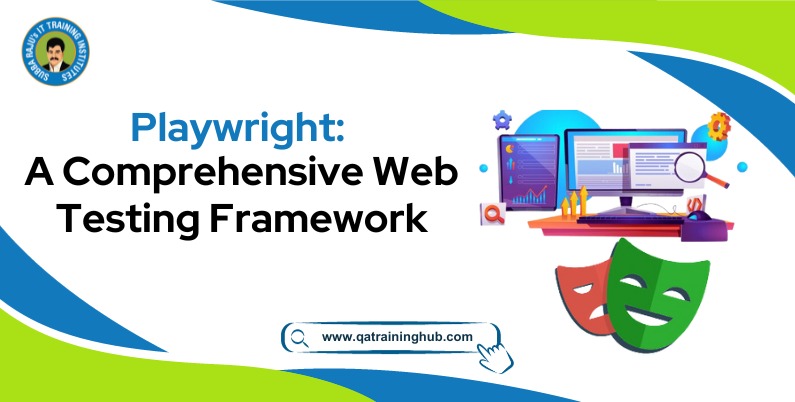An In-Depth Exploration of Playwright: A Comprehensive Web Testing Framework

In the fast-paced world of web development, ensuring the reliability and functionality of web applications is paramount. To achieve this, robust and efficient testing frameworks are essential. Playwright, an emerging open-source tool, has gained traction for its powerful capabilities in web testing. This article delves into an in-depth exploration of Playwright, covering its features, architecture, how it works, and an analysis of its pros and cons.
Understanding Playwright
Playwright is a relatively new web automation framework that allows developers and testers to write end-to-end tests for web applications. It was developed by Microsoft and provides a unified API to automate interactions with different web browsers like Chromium, WebKit, and Firefox. It aims to simplify the process of browser automation and improve cross-browser testing.
Key Features of Playwright
Cross-Browser Support: Playwright supports multiple browser engines, enabling testing across various browsers without modifying the test code.
Single API: With a unified API, it allows developers to write tests once and run them across different browsers, streamlining the testing process.
Multi-Page and Multi-Context Testing: Playwright enables parallel testing across multiple pages and contexts within a single browser instance, enhancing testing efficiency.
Native Events: Playwright uses native input events for automation, ensuring more accurate simulation of user interactions with the application.
Request and Response Interception: Developers can intercept and modify network requests and responses, facilitating efficient testing of network-related functionalities.
Intelligent Wait Handling: Playwright automatically waits for elements to be present and visible, reducing the need for manual wait commands and enhancing test reliability.
Device Emulation: Playwright allows emulation of various devices, screen sizes, and resolutions for comprehensive testing on different platforms.
How Playwright Works
Playwright operates by automating interactions with web pages through browser automation. It essentially launches the specified browser instances and controls them to simulate user actions such as clicking buttons, filling forms, navigating between pages, and more. The tests are written in JavaScript or TypeScript, utilizing the Playwright API to define the actions to be performed.
Playwright uses a client-server architecture. The test scripts (clients) communicate with the browser instances (servers) through a protocol, enabling efficient execution and interaction. This approach allows seamless communication and control over multiple browser instances simultaneously.
Pros of Using Playwright
- Cross-Browser Compatibility
One of the major advantages of Playwright is its ability to test web applications across different browsers using a single set of tests. This saves a significant amount of time and effort that would otherwise be spent writing separate test scripts for each browser. - Unified API
The unified API provided by Playwright simplifies test creation and maintenance. Developers can write tests using a single set of commands that work seamlessly across all supported browsers, streamlining the testing process and reducing the learning curve. - Efficient Parallel Execution
Playwright allows for parallel execution of tests on multiple pages and contexts within a single browser instance. This capability enhances the efficiency of the testing process, enabling faster feedback and quicker identification of potential issues. - Native Event Handling
By utilizing native input events, it ensures that the automation closely mimics real user interactions. This results in more accurate and reliable tests, contributing to the robustness of the test suite. - Request and Response Interception
The ability to intercept and modify network requests and responses is a powerful feature that allows developers to simulate various network conditions and responses. This is invaluable for testing applications that heavily rely on network interactions. - Intelligent Wait Handling
Playwright automatically waits for elements to be present and visible before interacting with them. This intelligent wait handling significantly reduces the need for manual waiting commands, making tests more efficient and reliable.
Cons of Using Playwright
- Maturity and Community Support
Being a relatively new tool, Playwright is still evolving, and its community support, while growing, may not be as extensive as some more established frameworks. This can lead to challenges in finding comprehensive resources and solutions for specific issues. - Learning Curve
While Playwright aims to simplify web automation, there is still a learning curve, especially for those new to automation or web testing. Understanding the nuances of the API and the underlying concepts might take some time. - Limited Browser Extensions Support
As of the current state, Playwright has limited support for browser extensions, which can be a drawback if your application relies heavily on specific extensions for functionality. - Performance Overheads
While Playwright’s automation is efficient, there may be slight performance overheads compared to direct manual interaction due to the additional layer of automation. However, the benefits in terms of consistent, repeatable, and scalable testing outweigh this concern in most scenarios.
Conclusion
Playwright is a promising addition to the web testing landscape, offering a unified and efficient approach to cross-browser automation. Its features like cross-browser compatibility, unified API, and intelligent wait handling make it a compelling choice for developers and testers looking to streamline their testing processes.
However, like any tool, it’s essential to weigh the pros and cons and evaluate how well it fits within your specific project requirements and ecosystem. As Playwright continues to evolve and gain traction in the testing community, it is expected to address its limitations and further solidify its position as a go-to web automation framework. With its potential to simplify testing workflows and improve the quality of web applications, Playwright is undoubtedly worth exploring and considering for your testing endeavors.
If you want to become an expert in the subject, join QA Training Hub, best testing tools training institute in Hyderabad.

